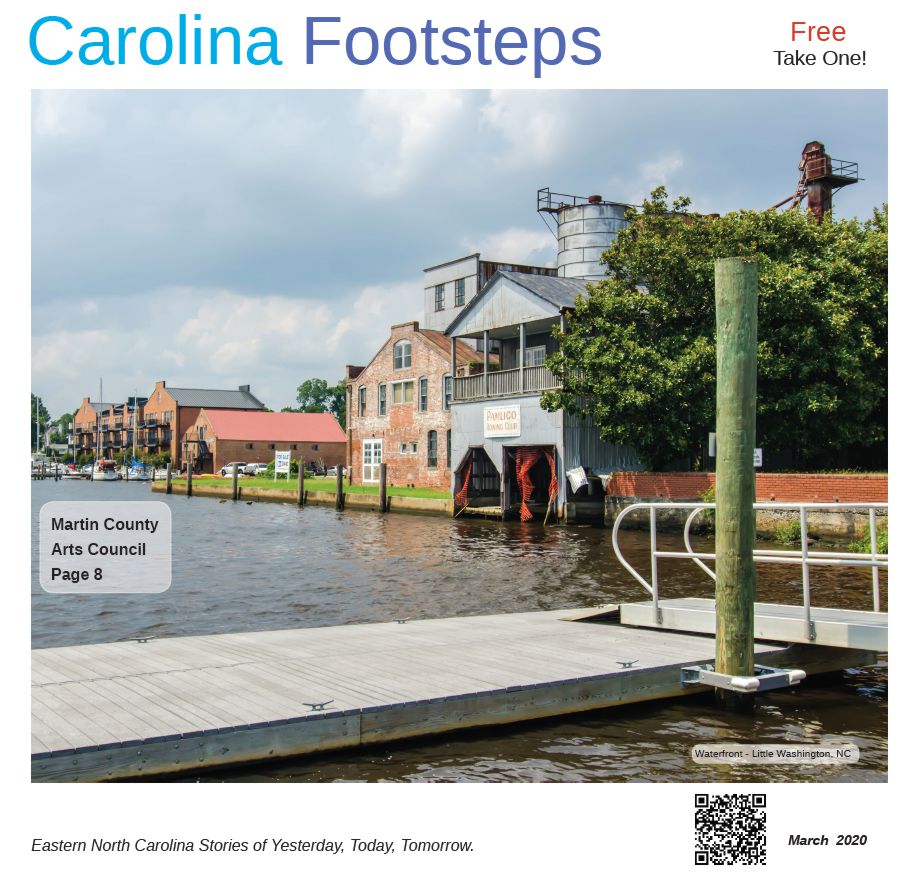Since early voting starts October 17th, we prepared
questions to inform readers about a local sheriff’s race
and candidates’ understanding of the Bill of Rights and law
enforcement standards.
1) The Fourth Amendment prohibits unreasonable search
and seizure and requires probable cause. As Sheriff, how
would you advise deputies when it comes to traffic stops,
DUI, and DWI?
Jim Bray: “I prefer to use more probable cause than an odor,
unless it’s very strong. The officer must consider the totality
of the circumstances.
While traffic checkpoints catch drunk drivers and drug users,
there still must be probable cause to search a vehicle.
Stopping a car without a reason is going too far. A lot of
people don’t realize they have to consent to a search, even
if they are pulled over by police for an infraction. The exception
is if there is drug paraphernalia in plain view or a driver
is intoxicated.”
Shelby White: “ You do have to have an odor to search the
car for drugs. For alcohol, that’s a different situation because
you need to delegate it to Highway Patrol.
We have to look into any tip and can do it with a knock and
talk. We might want to do surveillance, a pop-by, or send an
undercover vehicle to check on activity. We keep working
the case to get a search warrant.
Even if it’s a weekend, we can get a search warrant by a
magistrate. I prefer getting one from a superior court judge
so they will more readily accept the case if taken to a federal
level.”
2) Do you believe in ‘stop and frisk?’
Jim Bray : “’Stop and frisk’ can be used for officer safety in
a DWI.”
Shelby White: “[From the perspective of a cop on foot patrol]
I have to have a reason to stop you. Heavy duty profiling
doesn’t exist in this area. I do believe in stop and frisk’ for
officer safety.”
3) What are your standards for obtaining a confession? If
you are familiar with the REID technique which allows false
evidence to legally be presented to elicit a confession, will
you use this, or will you hold yourself and your deputies to a
higher standard?
Jim Bray: “ I am familiar with the REID technique. I don’t believe
in lying and deceiving people. I believe in being honest
and those in my command will be straightforward.
I do believe time-sensitive situations may require an interrogator
to push it to the limits- such as a child abduction or
missing person. I don’t know if law enforcement in this area
have ever used extremely aggressive tactics the way one
might see in a large area.”
Shelby White: “ I am not familiar with the REID technique
but realize this is legal. I stay within what is legal and do
not go beyond this. We don’t want to lead someone to a
false statement but work towards the truth. I want evidence
instead of a false confession.”
4) How long will you build a case before it goes to a speedy
public trial? Don’t you think in a small community with word
of mouth quickly spreading, this impedes a person’s rights if
the process drags on?
Jim Bray: “I’ve never seen a speedy public trial. It usually
has nothing to do with law enforcement, although they may
wait for the SBI to handle evidence. Usually, defendants and
their attorneys continue a case. They may even ‘judge shop’
for who they believe to be most lenient in cases like DWIs.”
Shelby White: “ A speedy public trial is impossible. It could
happen a year from now.
We have so many people in a jury pool to choose from that it
wouldn’t be unfair in a small town. Out of 75 applicants, you
can get 13 who are unbiased.”
5) A Perquimans County resident whose home was burglarized
three times in three months expressed concern
responding officers didn’t appear confident or well-trained.
How frequently will your officers be trained, and how will
you re-certify them so they understand proper handling of
evidence?
Jim Bray: “ Officers currently do not have formal training on
the collection of evidence, and if it is, it’s very little. They
refer a lot of it to state troopers at this time. I’d like to work
with the Justice Academy in Salemburg, which partners with
local agencies for free- less room and board costs.
In Currituck County Sheriff’s Office, certain training is required
when officers hit the three and six year marks. I feel
this needs to happen here also.
In addition, I would implement a physical fitness program
like the state has for its troopers. This would be a benchmark
to help them deal with the stress of the job.”
Shelby White: “During in-processing, I train the officers.
They label evidence, and it’s computer-based. We’ve never
had a problem with handling evidence.
The deputies and investigators go to schools throughout the
year as their schedule permits, so they know what to look
for. The training is basically free through the state.”
6) What will you do to make sure your officers are trained in
DWI and capable of handling this?
Jim Bray: “ DWI training is a huge problem. Officers can do
an intoxilizer and 3-day ARIDE training that focuses more
on drug impairment. I want to make sure all of my deputies
have proper knowledge to handle this instead of just a few.
Shelby White: “All officers are trained at Alkasensor school,
but only some are trained to use the Breathalyzer. [As previously
stated,] that’s why it’s passed off to Highway Patrol.”
7) How will you work with the state and county to stop drug
and human trafficking? What can you do to make sure
officers handle this?
Jim Bray: “ I am not aware of human trafficking in Perquimans
County, but I’ve heard it is a problem in the western
part of the state. It seems that there is not an industry in our
county that would support that.
I would do surveillance on users and find informants who
can tell us where the dealers are. I would also bring back the
drug task force, where people from different counties send
undercover cops. The drug houses in our area are known,
but we must catch dealers when their shipment comes in
and before it goes out.”
Shelby White: “There is no doubt drug trafficking is here.
Perquimans County is actually better off at Gates and
Chowan. All the time, we are getting drugs off the street.
I’ve arrested more people for drugs in Perquimans County
than anybody. My record includes over 250 plus drug
arrests- which led to over 40 federal convictions with 3-28
year prison sentences. I’ve worked a lot if cases with SBI,
FBI, and ATF.
I’ve already started a drug unit. Before that, there was no
dedicated person strictly working these cases. I have an
informant base after 18 years of experience. [...]
Drug stuff is not just based on traffic stops, but involves work
undercover. Cooperating witnesses and informants may
have certain conditions they expect. We may appear partial,
but it’s because we keep working the case until 6, 8, 10 buys
lead us to the dealer.
Traffic stops are good, but 98% of the time, they get users.
We’re targeting dealers. I’ve caught John Aaron Bailey and
Bubba Lee, but other drug dealers pop up next to take their
place. It’s an ongoing fight.
I have not personally seen human trafficking, although I’ve
talked with [Brew 2 Rescue Cafe] across the street about
what to look for.
Perquimans County is honestly better than any county
around us. EMS [has been issued] a nasal spray for
overdoses. Only 5 were used in Perquimans before May.
Pasquotank used 70.
Drugs don’t just affect one person, but everyone around
them. There is an Angel Program in Rocky Mount through
the Albemarle Overdose Prevention Coalition that hasn’t
started here but I’d like to implement. We tell [an addict]:
‘Bring your stuff to us turn it all in, and you won’t be
charged.’
We have a mobile crisis unit that can help people that want
to stop, but logistically getting people to where they can go
for help is a problem. They need help today and can’t wait
until tomorrow.”
Part 3 Tomorrow
questions to inform readers about a local sheriff’s race
and candidates’ understanding of the Bill of Rights and law
enforcement standards.
1) The Fourth Amendment prohibits unreasonable search
and seizure and requires probable cause. As Sheriff, how
would you advise deputies when it comes to traffic stops,
DUI, and DWI?
Jim Bray: “I prefer to use more probable cause than an odor,
unless it’s very strong. The officer must consider the totality
of the circumstances.
While traffic checkpoints catch drunk drivers and drug users,
there still must be probable cause to search a vehicle.
Stopping a car without a reason is going too far. A lot of
people don’t realize they have to consent to a search, even
if they are pulled over by police for an infraction. The exception
is if there is drug paraphernalia in plain view or a driver
is intoxicated.”
Shelby White: “ You do have to have an odor to search the
car for drugs. For alcohol, that’s a different situation because
you need to delegate it to Highway Patrol.
We have to look into any tip and can do it with a knock and
talk. We might want to do surveillance, a pop-by, or send an
undercover vehicle to check on activity. We keep working
the case to get a search warrant.
Even if it’s a weekend, we can get a search warrant by a
magistrate. I prefer getting one from a superior court judge
so they will more readily accept the case if taken to a federal
level.”
2) Do you believe in ‘stop and frisk?’
Jim Bray : “’Stop and frisk’ can be used for officer safety in
a DWI.”
Shelby White: “[From the perspective of a cop on foot patrol]
I have to have a reason to stop you. Heavy duty profiling
doesn’t exist in this area. I do believe in stop and frisk’ for
officer safety.”
3) What are your standards for obtaining a confession? If
you are familiar with the REID technique which allows false
evidence to legally be presented to elicit a confession, will
you use this, or will you hold yourself and your deputies to a
higher standard?
Jim Bray: “ I am familiar with the REID technique. I don’t believe
in lying and deceiving people. I believe in being honest
and those in my command will be straightforward.
I do believe time-sensitive situations may require an interrogator
to push it to the limits- such as a child abduction or
missing person. I don’t know if law enforcement in this area
have ever used extremely aggressive tactics the way one
might see in a large area.”
Shelby White: “ I am not familiar with the REID technique
but realize this is legal. I stay within what is legal and do
not go beyond this. We don’t want to lead someone to a
false statement but work towards the truth. I want evidence
instead of a false confession.”
4) How long will you build a case before it goes to a speedy
public trial? Don’t you think in a small community with word
of mouth quickly spreading, this impedes a person’s rights if
the process drags on?
Jim Bray: “I’ve never seen a speedy public trial. It usually
has nothing to do with law enforcement, although they may
wait for the SBI to handle evidence. Usually, defendants and
their attorneys continue a case. They may even ‘judge shop’
for who they believe to be most lenient in cases like DWIs.”
Shelby White: “ A speedy public trial is impossible. It could
happen a year from now.
We have so many people in a jury pool to choose from that it
wouldn’t be unfair in a small town. Out of 75 applicants, you
can get 13 who are unbiased.”
5) A Perquimans County resident whose home was burglarized
three times in three months expressed concern
responding officers didn’t appear confident or well-trained.
How frequently will your officers be trained, and how will
you re-certify them so they understand proper handling of
evidence?
Jim Bray: “ Officers currently do not have formal training on
the collection of evidence, and if it is, it’s very little. They
refer a lot of it to state troopers at this time. I’d like to work
with the Justice Academy in Salemburg, which partners with
local agencies for free- less room and board costs.
In Currituck County Sheriff’s Office, certain training is required
when officers hit the three and six year marks. I feel
this needs to happen here also.
In addition, I would implement a physical fitness program
like the state has for its troopers. This would be a benchmark
to help them deal with the stress of the job.”
Shelby White: “During in-processing, I train the officers.
They label evidence, and it’s computer-based. We’ve never
had a problem with handling evidence.
The deputies and investigators go to schools throughout the
year as their schedule permits, so they know what to look
for. The training is basically free through the state.”
6) What will you do to make sure your officers are trained in
DWI and capable of handling this?
Jim Bray: “ DWI training is a huge problem. Officers can do
an intoxilizer and 3-day ARIDE training that focuses more
on drug impairment. I want to make sure all of my deputies
have proper knowledge to handle this instead of just a few.
Shelby White: “All officers are trained at Alkasensor school,
but only some are trained to use the Breathalyzer. [As previously
stated,] that’s why it’s passed off to Highway Patrol.”
7) How will you work with the state and county to stop drug
and human trafficking? What can you do to make sure
officers handle this?
Jim Bray: “ I am not aware of human trafficking in Perquimans
County, but I’ve heard it is a problem in the western
part of the state. It seems that there is not an industry in our
county that would support that.
I would do surveillance on users and find informants who
can tell us where the dealers are. I would also bring back the
drug task force, where people from different counties send
undercover cops. The drug houses in our area are known,
but we must catch dealers when their shipment comes in
and before it goes out.”
Shelby White: “There is no doubt drug trafficking is here.
Perquimans County is actually better off at Gates and
Chowan. All the time, we are getting drugs off the street.
I’ve arrested more people for drugs in Perquimans County
than anybody. My record includes over 250 plus drug
arrests- which led to over 40 federal convictions with 3-28
year prison sentences. I’ve worked a lot if cases with SBI,
FBI, and ATF.
I’ve already started a drug unit. Before that, there was no
dedicated person strictly working these cases. I have an
informant base after 18 years of experience. [...]
Drug stuff is not just based on traffic stops, but involves work
undercover. Cooperating witnesses and informants may
have certain conditions they expect. We may appear partial,
but it’s because we keep working the case until 6, 8, 10 buys
lead us to the dealer.
Traffic stops are good, but 98% of the time, they get users.
We’re targeting dealers. I’ve caught John Aaron Bailey and
Bubba Lee, but other drug dealers pop up next to take their
place. It’s an ongoing fight.
I have not personally seen human trafficking, although I’ve
talked with [Brew 2 Rescue Cafe] across the street about
what to look for.
Perquimans County is honestly better than any county
around us. EMS [has been issued] a nasal spray for
overdoses. Only 5 were used in Perquimans before May.
Pasquotank used 70.
Drugs don’t just affect one person, but everyone around
them. There is an Angel Program in Rocky Mount through
the Albemarle Overdose Prevention Coalition that hasn’t
started here but I’d like to implement. We tell [an addict]:
‘Bring your stuff to us turn it all in, and you won’t be
charged.’
We have a mobile crisis unit that can help people that want
to stop, but logistically getting people to where they can go
for help is a problem. They need help today and can’t wait
until tomorrow.”
Jim Bray
Shelby White
Part 3 Tomorrow
Meet Perquimans County Sheriff Candidates Part 2 -- by Laura Bush Jenkins
 Reviewed by kensunm
on
7:00:00 PM
Rating:
Reviewed by kensunm
on
7:00:00 PM
Rating:
 Reviewed by kensunm
on
7:00:00 PM
Rating:
Reviewed by kensunm
on
7:00:00 PM
Rating:








No comments: